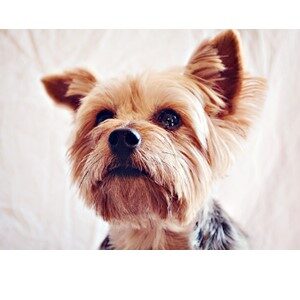Best Dog Beds for Yorkshire Terriers
Good Dog Beds Make Yorkies Comfortable!
Introduction
The best dog beds for Yorkshire Terriers takes into consideration their health, sleeping style and preferences. Orthopedic dog beds are a great choice.
This breed is affectionately known as the Yorkie, is a small and glamorous breed that originated in Yorkshire, England, during the 19th century.
The Yorkie is characterized by their silky, long blue and tan coat, which requires regular grooming to maintain its beauty. These dogs are energetic and enjoy daily walks and playtime.
They are intelligent and quick to learn, Yorkies thrive on attention and make excellent indoor pets, adapting well to apartment living with the proper care and exercise.
This breed is known for their affectionate nature and a strong bond with their owners. As a potential Yorkie owner, we will provide you with some facts about this breed you may not know about, costs of ownership, health issues, and the best dog beds for this dog.
With this information should help you to decide if you want to own one of these dogs.
Best Dog Beds for Yorkies
When selecting a dog bed, it’s important to consider your dog’s size, age, sleeping habits, and any specific health needs. Here are the best types of dog beds and what to look for in each:
Types of Dog Beds
1. Orthopedic Beds
- Ideal for: Older dogs, dogs with arthritis or aching joint and muscle issues.
- Features: High-density memory foam provides support and alleviates pressure on joints.
- Examples: PetFusion Ultimate Pet Bed, BarksBar Orthopedic Dog Bed.
2. Bolster Beds
- Ideal for: Dogs that like to curl up or lean against something while resting or sleeping.
- Features: Raised edges or bolsters around the bed for support and security.
- Examples: Best Friends by Sheri The Original Calming Shag Fur Donut Cuddler, Furhaven Pet Dog Bed.
3. Heated or Self-Warming Beds
- Ideal for: Dogs that are sensitive to cold, older dogs, and dogs with joint or muscle issues.
- Features: Integrated heating element to provide gentle warmth or warming material that uses the dog’s body to provide the heat to keep the bed warm.
- Examples: K&H Pet Products Thermo-Snuggly Sleeper Heated Pet Bed, Lectro-Soft Outdoor Heated Bed.
4. Cooling Beds
- Ideal for: Dogs that overheat easily and dogs that live in warm climates.
- Features: Cooling gel or breathable materials to help regulate the dog’s body temperature.
- Examples: K&H Pet Products Cool Bed III, The Green Pet Shop Cooling Pet Pad.
5. Cave or Hooded Beds
- Ideal for: Dogs that like to burrow or feel secure in enclosed places when sleeping or resting.
- Features: Hooded or enclosed design which provides a den-like environment.
- Examples: Petmaker Cozy Cottage Pet Bed, Snoozer Cozy Cave Pet Bed.
6. Elevated Beds
- Ideal for: Dogs that need extra air circulation or for outdoor use.
- Features: Raised platform with breathable mesh or fabric surface that allows air to circulate.
- Examples: Coolaroo Elevated Pet Bed, K&H Pet Products Original Pet Cot.
7. Luxury Beds
- Ideal for: Owners looking for stylish and comfortable options.
- Features: High-quality materials often designer aesthetics.
- Examples: LazyBornezz Metropolitan Pet Bunk Bed, Bowsers Donut Bed.
What To Look For
When buying a bed for your dog, you must know their preferences, measurements, and sleeping position. All of these play a vital role in looking for the best bed for your Yorkie.
- Size
- Ensure the bed is appropriately sized for your dog which allows them to stretch out comfortably without any parts hanging over the edge of the bed.
- Measure your dog from their nose to the tail and add a few inches for comfort.
2. Material
- Choose durable and easy-to-clean bed materials.
- Look for machine-washable covers or beds that are water-resistant.
3. Comfort and Support
- Consider memory foam or orthopedic options for older dogs or those that have arthritis or joint issues.
- Soft and plush materials are generally more comfortable for most dogs.
- When buying an orthopedic bed, look for the CertiPUR-US seal. This means that the materials used do not contain any chemicals or toxins that are harmful to humans and pets.
4. Design and Functionality
- Bolster or raised-edge beds provide security and support for dogs that like to lean against something when sleeping.
- Consider whether your dog prefers to curl up, stretch out or burrow. Select a bed that matches this style.
5. Temperature Control
- Heated beds are good for cold climates or for older dogs and dogs that might be losing hair or fur.
- Cooling beds are for warm climates or for dogs that overheat easily.
6. Safety and Non-Toxic Materials
- Ensure the bed selected is made of non-toxic and pet safe materials.
- Check the bed for any small or loose parts that could be a potential choking hazard.
7. Non-Slip Bottom
- This especially important for older dogs or dogs that are less mobile to prevent the bed from slipping when they go on and off the bed.
8. Portability
- If you travel often, look for a bed that is easy to transport and is foldable.
9. Style and Aesthetics
- Choose a bed that fits well with your home’s decor if that is important to you.
Choosing the right bed for your dog involves understanding their specific needs and preferences. By considering factors like size, material, comfort, sleeping style, and temperature control, you can ensure your dog has a cozy and supportive place to rest.
Facts About Yorkies
We will now share some facts about Yorkies that you may not know about.
-
- Origin and History: Yorkshire Terriers originated in the 19th century in the county of Yorkshire, England. They were initially bred to catch rats in textile mills but quickly became favored companions for European high society. Understanding their roots helps explain their brave and determined nature.
- Coat & Grooming: One of the breed’s most distinctive features is its fine, silky coat, which closely resembles human hair. Yorkies are considered hypoallergenic, making them a good choice for allergy sufferers. However, their beautiful coats require regular grooming to prevent tangles and mats, including daily brushing and regular professional grooming.
- Temperament: Yorkies are known for their energetic, confident, and often feisty personality. They are affectionate and form strong bonds with their owners but can also be stubborn.
- Exercise Needs: Despite their small size, Yorkies are active dogs that require regular exercise. Daily walks and playtime are important to keep them mentally and physically stimulated.
- Health: Like many small dog breeds, Yorkies can be prone to certain health issues such as dental problems, patellar luxation (knee joint issues), and tracheal collapse. Regular veterinary check-ups are important.
- Lifespan: On average, Yorkies live between 12 to 15 years, but with proper care, some can live even longer.
- Intelligence: Yorkies are intelligent dogs and can be quick learners, although their independent nature can sometimes make training a challenge. Positive reinforcement methods work best with them.
- Popularity: Yorkies are consistently ranked among the most popular dog breeds in the United States and other countries due to their small size, charming personality, and glamorous appearance. It is currently the 13th most popular breed in the United States according to AKC.
- Adaptability: Despite their small stature, Yorkies can adapt well to various living situations, including apartments, as long as they receive enough attention, exercise, and mental stimulation.
- Hair: Yorkies have hair, not fur, which makes them a good option for people with allergies. Their silky coat requires regular grooming to maintain its health and appearance.
- Brave and Bold: Despite their small size, Yorkies are known for their courageous and confident nature. They will often stand up to much larger dogs without hesitation.
- Popular Pets: Yorkshire Terriers consistently rank among the most popular dog breeds in the United States and other countries due to their charming personality and portable size.
Health Issues
Yorkshire Terriers, like all breeds, are prone to certain health issues. Here are some of the most common health problems that affect Yorkshire Terriers:
- Dental Issues: Yorkies are prone to dental problems such as tooth decay, gum disease (periodontal disease), and tooth loss. Regular dental care, including brushing their teeth and dental check-ups, is essential.
- Patellar Luxation: This is a condition where the kneecap (patella) moves out of its normal position, which can cause lameness or difficulty walking. It’s common in small breeds like Yorkies.
- Tracheal Collapse: The trachea (windpipe) weakens and collapses, leading to coughing, gagging, and difficulty breathing, especially during exercise or excitement. Yorkies are predisposed due to their small size and delicate tracheal structure.
- Hypoglycemia: Low blood sugar levels can occur, especially in Yorkie puppies, due to their small size and high energy levels. This can lead to weakness, trembling, seizures, and even coma if not treated promptly.
- Portosystemic Shunt (Liver Shunt): This is a congenital condition where abnormal blood vessels bypass the liver, causing toxins to accumulate in the bloodstream. It can lead to stunted growth, neurological symptoms, and other health issues.
- Eye Problems: Yorkies can be prone to various eye conditions such as progressive retinal atrophy (PRA), cataracts, and dry eye (keratoconjunctivitis sicca). Regular eye examinations by a veterinarian are important.
- Collapsed Trachea: Similar to tracheal collapse, this is a condition where the cartilage rings of the trachea weaken and can lead to respiratory issues.
- Legg-Calvé-Perthes Disease: This is a condition where the blood supply to the femoral head (top of the thigh bone) is disrupted, leading to degeneration of the bone and joint. It can cause pain and lameness.
- Pancreatitis: Yorkies can be predisposed to inflammation of the pancreas, which can cause digestive issues, abdominal pain, and potentially life-threatening complications.
- Allergies: Like many breeds, Yorkshire Terriers can develop allergies to environmental allergens (pollen, dust mites) or food allergies, leading to skin irritation, itching, and discomfort.
- Obesity: Can cause or worsen joint problems, digestive and metabolic disorders, back pain, and heart disease. You must control their daily food intake. Remember, treats should not exceed more than 10% of their daily calories.
It’s important for Yorkie owners to be aware of these potential health issues and to work closely with their veterinarian to monitor their dog’s health, provide preventive care, and address any health concerns promptly. Regular veterinary check-ups and a healthy lifestyle can help mitigate some of these risks.
Costs of Owning a Yorkie
Owning a Yorkshire Terrier involves various costs that prospective owners should consider. Here’s a breakdown of the average costs associated with owning a Yorkie:
- Initial Purchase Price: The cost of purchasing a Yorkshire Terrier puppy from a reputable breeder can range from $800 to $10,000 or more, depending on factors such as the breeder’s reputation, lineage of the puppy, and location.
- Veterinary Care: Annual veterinary expenses for routine check-ups, vaccinations, flea and tick prevention, and dental care can range from $200 to $600 or more, depending on the health needs of the dog and the area you live in.
- Food: Quality dog food suitable for small breeds like Yorkies can cost approximately $20 to $60 per month, depending on the brand and dietary needs of your dog.
- Grooming: Yorkshire Terriers have a long, silky coat that requires regular grooming. Grooming expenses can include grooming supplies (brushes, combs, shampoo) and occasional professional grooming sessions, which can cost around $30 to $100 per session, depending on location and services provided.
- Training and Behavior: Basic training classes or private sessions to help socialize and train your Yorkie can range from $50 to $200 or more, depending on the trainer and training method.
- Pet Insurance: Monthly premiums for pet insurance can vary widely based on coverage options, your location, the age of your dog, and the insurer. On average, pet insurance for a Yorkshire Terrier might range from $20 to $50 per month.
- Toys and Accessories: Costs for toys, bedding, collars, leashes, and other accessories can add up to approximately $100 to $300 per year, depending on your preferences and the durability of the items purchased.
- Emergency and Unexpected Costs: It’s wise to budget for unexpected veterinary expenses, such as accidents, illnesses, or surgeries, which can range from hundreds to thousands of dollars depending on the severity of the issue.
- License and Registration: Some areas require you to license your dog annually, which typically costs $10 to $20 per year. Registration with kennel clubs or breed organizations may also have associated fees.
- Travel and Boarding: Costs for pet-sitting, boarding, or travel accommodations when you’re away can vary widely based on location and the level of care required, ranging from $20 to $70 per day or more.
Total Annual Cost: The total annual cost of owning a Yorkshire Terrier can range from approximately $1,000 to $3,000 or more, depending on factors such as your location, lifestyle, and the specific needs of your dog.
Initial costs, such as purchasing the dog and setting up your home for them, will be higher in the first year. It’s important to budget for these expenses and be prepared for the financial commitment of owning a dog, ensuring you can provide for their health, well-being, and happiness throughout their life.
Yorkie Ownership Tips
Keeping your Yorkshire Terrier (Yorkie) healthy and fit involves a combination of proper diet, regular exercise, grooming, dental care, and regular veterinary check-ups. Here are some detailed tips to ensure your Yorkie remains in top shape:
- Balanced Diet
- High-Quality Food: Feed your Yorkie high-quality dog food that’s appropriate for their size, age, and health condition. Look for foods with real meat as the first ingredient and avoid fillers and artificial additives.
- Portion Control: Yorkies are small dogs and can easily become overweight. Follow the feeding guidelines on the food package and adjust based on your vet’s advice.
- Hydration: Ensure your Yorkie always has access to fresh water.
- Regular Exercise
- Daily Walks: Aim for at least 30 minutes of walking each day. This helps maintain a healthy weight and provides mental stimulation.
- Playtime: Engage in interactive play, such as fetch or tug-of-war. Yorkies are active and enjoy playing.
- Mental Stimulation: Use puzzle toys or training sessions to keep their minds active.
- Grooming
- Regular Brushing: Yorkies have long, silky hair that can easily tangle. Brush their coat daily to prevent mats and tangles.
- Bathing: Bathe your Yorkie every 3-4 weeks with a gentle dog shampoo.
- Haircuts: Trim their hair regularly, especially around the eyes, ears, and paws. Consider professional grooming every 6-8 weeks.
- Nail Trimming: Trim their nails every few weeks to prevent overgrowth and discomfort.
- Dental Care
- Brushing Teeth: Brush your Yorkie’s teeth daily or at least several times a week using a dog-specific toothbrush and toothpaste.
- Dental Treats: Offer dental chews or toys designed to promote dental health.
- Regular Check-Ups: Schedule professional dental cleanings as recommended by your vet.
- Veterinary Care
- Regular Check-Ups: Schedule annual or bi-annual vet visits for wellness exams.
- Vaccinations: Keep up with your Yorkie’s vaccination schedule.
- Parasite Prevention: Use flea, tick, and heartworm preventatives as recommended by your vet.
- Monitor Health: Keep an eye on any changes in behavior, appetite, or energy levels and consult your vet if you notice anything unusual.
- Socialization and Training
- Socialization: Expose your Yorkie to different people, animals, and environments to build confidence and reduce anxiety.
- Training: Consistent training using positive reinforcement helps your Yorkie learn good behavior and strengthens your bond.
- Comfort and Safety
- Safe Environment: Ensure your home is safe for a small dog. Keep toxic plants and substances out of reach and provide a comfortable bed.
- Temperature Control: Yorkies can be sensitive to extreme temperatures. Ensure they are warm in winter and cool in summer.
- Love and Attention
- Quality Time: Spend plenty of time with your Yorkie. They thrive on companionship and affection.
- Monitor Emotional Health: Yorkies can suffer from separation anxiety. Make sure they have company and stimulation when you’re not home.
By following these tips, you can help ensure your Yorkshire Terrier stays healthy, happy, and fit. Regular attention to their physical and emotional needs will go a long way in promoting their overall well-being.
Safe Foods and Foods To Avoid
Feeding your Yorkshire Terrier a balanced diet is crucial for their health. While commercial dog food should make up the majority of their diet, there are many human foods that are safe and even beneficial for them when given in moderation. Here’s a list of safe foods for your Yorkie:
Safe Foods for Yorkshire Terriers
Proteins:
- Cooked Chicken: Plain, boneless, and skinless. Avoid seasoning or spices.
- Cooked Turkey: Similar to chicken, ensure it’s plain (skinless) and without bones.
- Lean Beef: Cooked and unseasoned.
- Cooked Fish: Salmon and whitefish are good choices. Ensure all bones are removed.
- Eggs: Cooked eggs (scrambled or boiled) are a great source of protein and other nutrients.
Fruits:
- Apples: Remove the core and seeds. Apples are high in fiber and vitamins A and C.
- Blueberries: Rich in antioxidants and fiber.
- Bananas: A good source of potassium and vitamins but should be given in moderation due to high sugar content.
- Strawberries: High in fiber and vitamin C.
- Watermelon: Remove seeds and rind. It’s hydrating and low in calories.
Vegetables:
- Carrots: Raw or cooked, they are high in fiber and vitamins.
- Green Beans: Steamed or raw, they are low in calories and high in vitamins.
- Sweet Potatoes: Cooked and plain. They are rich in vitamins and fiber.
- Peas: Fresh, frozen, or cooked. They are a good source of vitamins and minerals.
- Pumpkin: Cooked and plain. Helps with digestion and is a good source of fiber.
Dairy:
- Plain Yogurt: Low-fat or fat-free, and without added sugar or artificial sweeteners. It’s a good source of probiotics.
- Cottage Cheese: In small amounts, it’s high in calcium and protein.
Grains:
- Rice: Plain, cooked white or brown rice is easily digestible.
- Oatmeal: Plain and cooked, it’s a good source of fiber.
Other Safe Foods:
- Peanut Butter: In small amounts and without xylitol (a sweetener that is toxic to dogs).
- Coconut Oil: In small amounts, it can improve skin and coat health.
Foods to Avoid
It’s equally important to know which foods to avoid, as some human foods can be toxic to all dogs:
- Chocolate
- Grapes and Raisins
- Onions and Garlic
- Avocado
- Alcohol
- Caffeine
- Macadamia Nuts
- Artificial Sweeteners (especially Xylitol)
- Raw Dough
Tips for Feeding Human Foods
- Introduce Slowly: Introduce any new food gradually to avoid stomach upset.
- Monitor Portions: Keep portions small to prevent overfeeding and obesity.
- Remove Choking Hazards: Ensure that foods are cut into small, manageable pieces.
- Check for Allergies: Watch for any signs of allergies, such as itching, swelling, or digestive issues.
- Consult Your Vet: Always consult your veterinarian before introducing new foods to ensure they are appropriate for your Yorkie’s specific health needs.
By providing these safe foods in moderation, you can add variety to your Yorkie’s diet and help ensure they get a range of nutrients to support their overall health.
Conclusion
We shared a lot of information about the Yorkshire Terrier (Yorkie) for potential owners which should be very helpful in your decision to get one.
Knowing the cost of owning a Yorkie, facts about this breed, health issues, safe foods and foods to avoid, and dog bed preferences should be beneficial to all owners and potential owners.
It is important to remember that if you own one of these dogs, you have some obligations to do such as training, feeding, and daily exercise.
You need to feed your dog with excellent food, and we listed some safe human foods you can give to your dog. Also, we shared some human foods that are harmful to them and should be avoided.
With the proper care, selecting a bed that fits their sleeping style, you should be able to provide them with comfort and security.
You can read about our other dog breed information articles by clicking HERE!
Shop Dog Beds
Shop dog beds for your dog by selecting or clicking on any bed of choice. You will be taken to Amazon where you can read customer reviews and answered questions and place the order.
As an Amazon Associate, I earn from qualifying purchases. Your purchase price is the same as if you shop directly on Amazon.
The price at time of publish is included below to give you an idea of what the price is; however, it is subject to change.
Cooling Gel Dog Beds
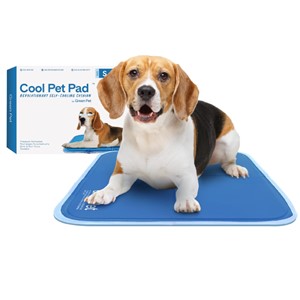
The Green Pet Shop Cooling Mat
Price At Time of Publish $40.00
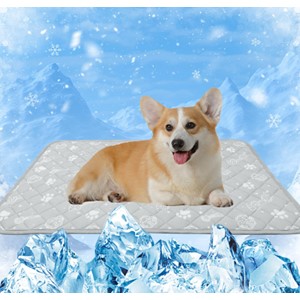
MH MYLUNE HOME Self Cooling Mat
Price At Time of Publish $40.00
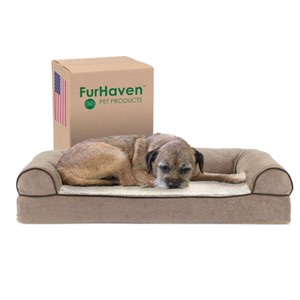
Furhaven Pet Products Cooling Gel Bolsters Small Bed
Price At Time of Publish $45.00
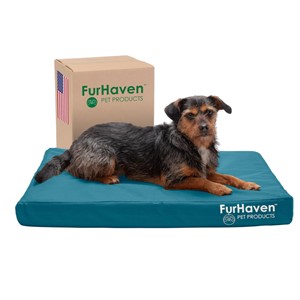
Furhaven Cooling Gel Medium Bed
Price At Time of Publish $42.00

ARF Pets Cooling Gel Pad
Price At Time of Publish $35.00
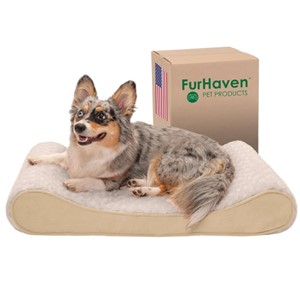
Furhaven Cooling Gel Small Bed
Price At Time of Publish $50.00
Price At Time of Publish $50.00
Orthopedic Dog Beds
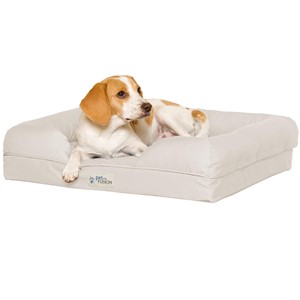
PetFusion Orthopedic Dod Bed
Price At Time of Publish $80.00
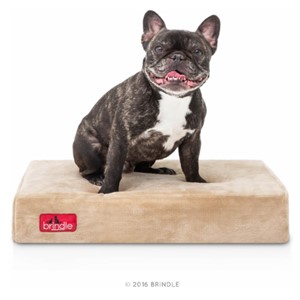
Brindle Orthopedic Bed Khaki
Price At Time of Publish $30.00
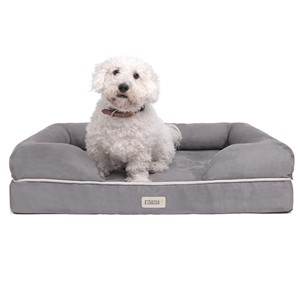
Friends Forever Orthopedic Bolster Bed
Price At Time of Publish $53.00
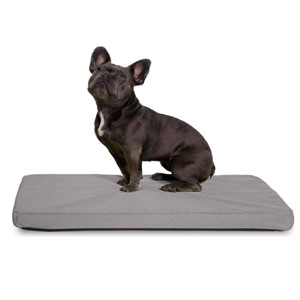
K9 Ballistics Tough Orthopedic Small Crate Bed
Price At Time of Publish $89.00
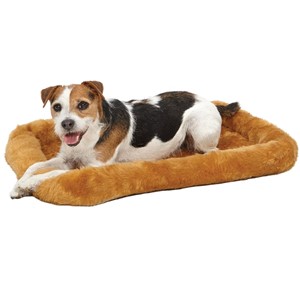
MidWest Homes Small Bolster Dog Bed
Price At Time of Publish $10.00
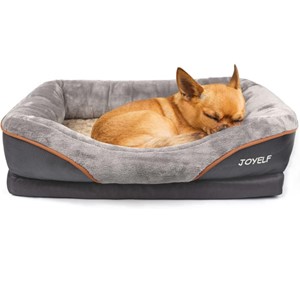
JOYELF Orthopedic Small Sofa Bed
Price At Time of Publish $40.00
Bolster Dog Beds
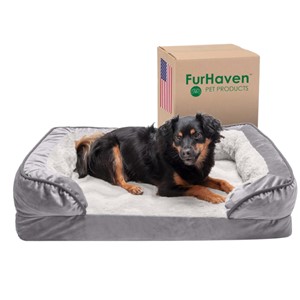
Furhaven Small-Medium Bolster Dog Bed
Price At Time of Publish $57.00
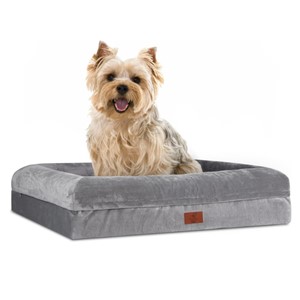
Yiruka Small Bolster Sofa Dog Bed
Price At Time of Publish $40.00
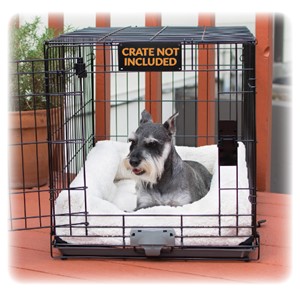
K&H Pet Products Bolster Crate Pad
Price At Time of Publish $22.00
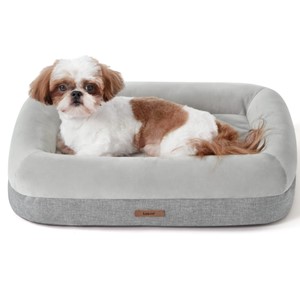
Leasure Small Bolster Dog Bed
Price At Time of Publish $40.00
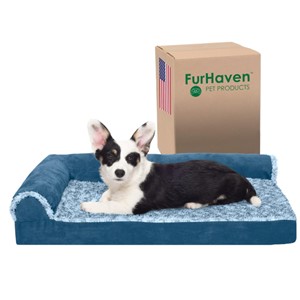
Furhaven Small-Medium L-Shaped Bed
Price At Time of Publish $39.00
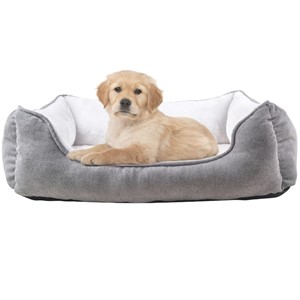
Long Rich Bolster Small Bed
Price At Time of Publish $27.00
Elevated Dog Beds
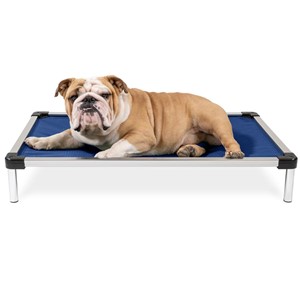
K9 Ballistics Chew Proof Elevated Small Bed
Price At Time of Publish $129.00
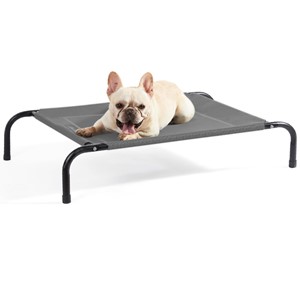
Bedsure Medium Elevated Dog Bed
Price At Time of Publish $33.00
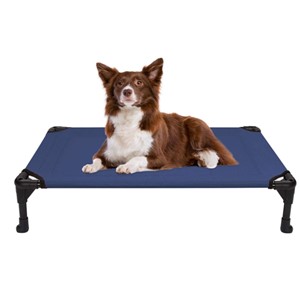
Veehoo Medium Elevated Dog Bed
Price At Time of Publish $45.00
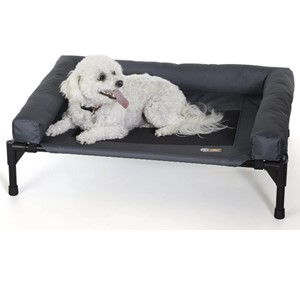
K&H Pet Products Elevated Bolster Dog Bed
Price At Time of Publish $57.00
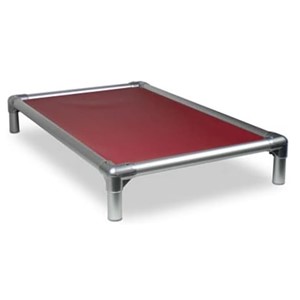
Kuranda Elevated Chew Proof Small Dog Bed
Price At Time of Publish $134.00
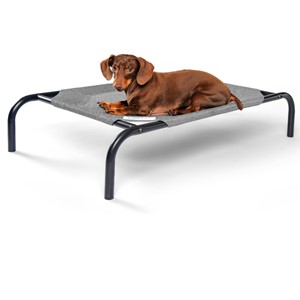
Coolaroo Small Elevated Dog Bed
Price At Time of Publish $21.00
Shop Cave/Donut Dog Beds
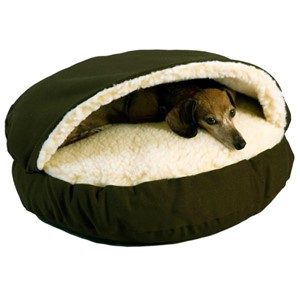
Snoozer Cozy Cave Bed
Price At Time of Publish $87.00
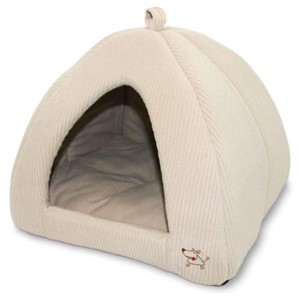
Best Pet Supplies Tent Bed
Price At Time of Publish $23.00
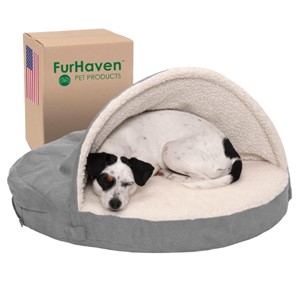
Furhaven Round Orthopedic Cave Bed
Price At Time of Publish $30.00
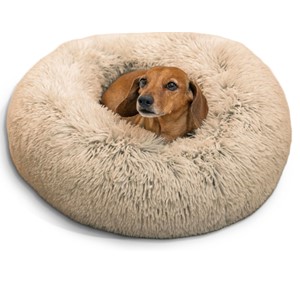
Best Friends by Sheri Original Calming Donut Bed
Price At Time of Publish $25.00
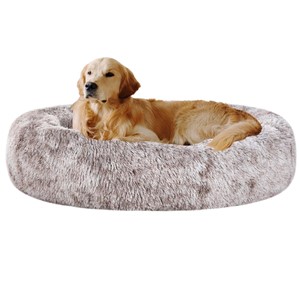
Coohom Oval Calming Donut Cuddler Bed
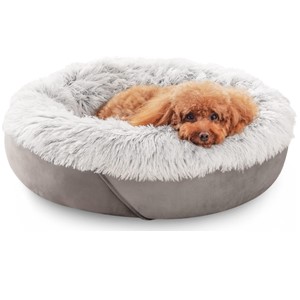
JOEJOY Calming Donut Small Dog Bed
Price At Time of Publish $33.00
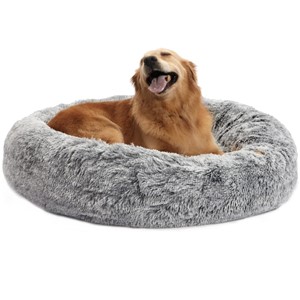
Bedfolks Calming Donut Dog Bed
Price At Time of Publish $66.00
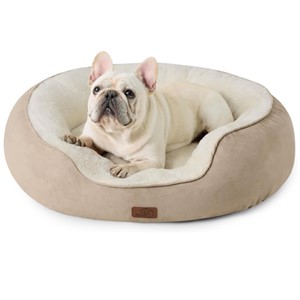
Bedsure Medium Donut Dog Bed
Price At Time of Publish $36.00

Bedsure Medium Donut Dog Bed
Price At Time of Publish $40.00
Related Articles
Below are some other articles of interest. Select or click on the article you want to learn more about.
- Are Crates Bad for Dogs
- Best Healthy Dog Food Brands
- Christmas Presents for My Dog
- Dog Parasite Symptoms
- How To Clean Dog Beds
- Ingredients To Avoid In Dog Treats
- Puppy Proofing Your House
- Signs Your Dog Is Ill
- Using Alexa for Dog Behaviors
- When Should A Dog Bed Be Replaced
Go back to the Dog Luxury Beds home page.
